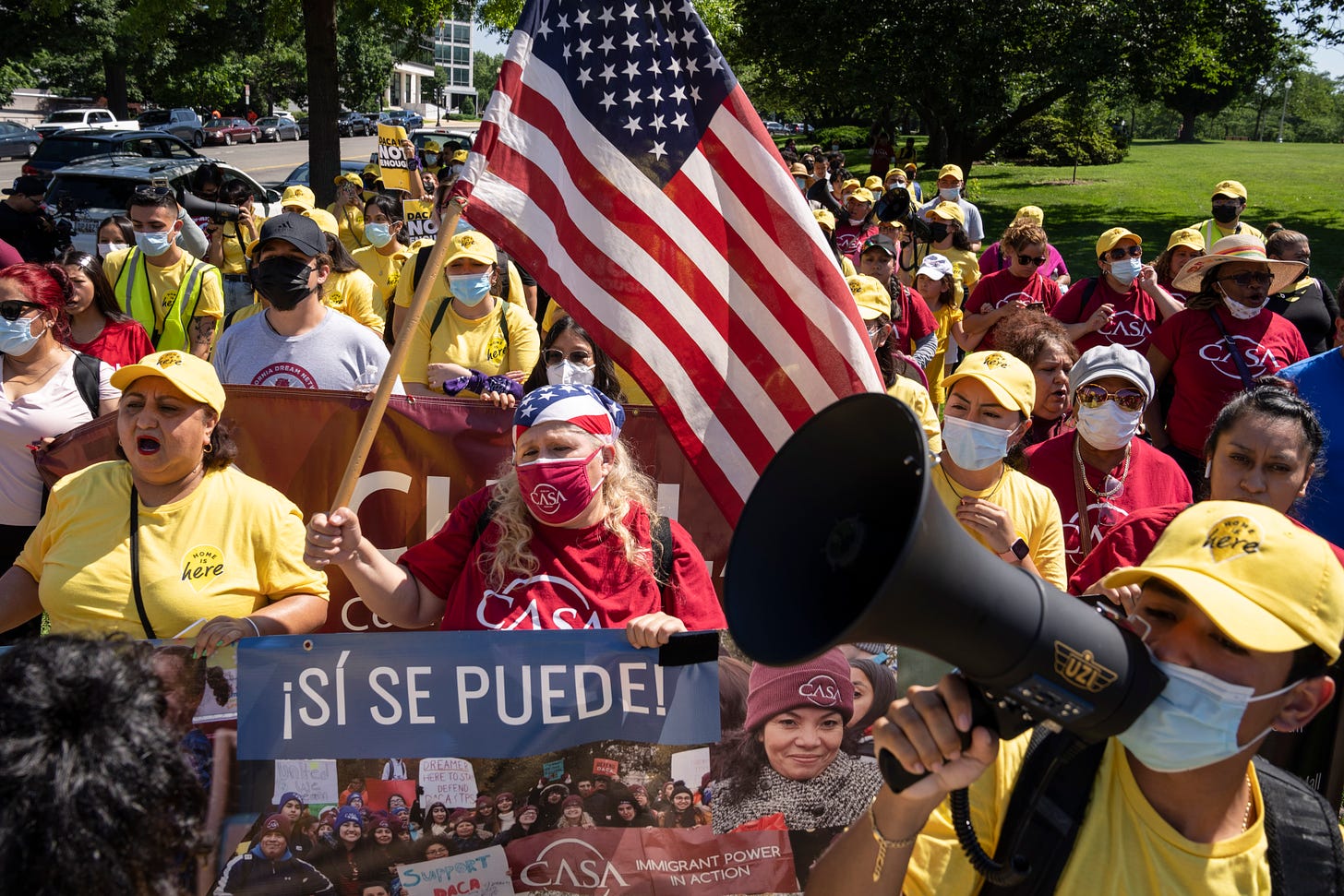The Dreamers' Fate Is Still Uncertain
Thanks to a recent court decision—and decades of Congressional inaction—hundreds of thousands could be deported.

THEY ARE AMONG THE MOST DESERVING and sympathetic of undocumented immigrants—Dreamers, whose parents brought them over the border when they were mere children—but they may soon lose the temporary legal status they’ve enjoyed for more than a decade. An Obama-era policy called Deferred Action for Childhood Arrivals (DACA) allowed Dreamers to remain in the United States and work so long as they had no criminal record, had paid any taxes owed, and graduated from high school or served in the military. Last week, Judge Andrew Hanen of the Southern District of Texas ruled the program illegal.
The case against DACA has been up and down the federal judiciary since the program was initiated in 2012 (a useful timeline can be found here), but ended up back in Hanen’s court on remand from the Fifth Circuit after the Biden administration issued formal rules to implement what had been a policy initiated by executive memorandum. When the Supreme Court considered the fate of DACA in 2020, the Justices found 5-4 that the Trump administration’s efforts to shut down the program altogether violated the Administrative Procedures Act, which gave supporters hope that if the policy went through formal rule-making under the APA, it might pass legal muster. Hanen’s decision in the latest challenge rejected that argument, but it will be appealed to the Fifth Circuit and ultimately the Supreme Court. Sadly, given the current composition of both courts, it’s unlikely to be overturned. So where does that leave Dreamers?
Hanen specifically allowed continued protection for current DACA participants, who number about 600,000, but barred the Department of Homeland Security from allowing new applications for the program. Some 400,000 young people who meet DACA’s eligibility standards but cannot apply are therefore subject to deportation. And it isn’t just the DACA recipients who are affected. According to the advocacy group FWD.US, more than one million U.S. citizens live in households with DACA members. And among DACA recipients, nearly half have some college education, nearly 80 percent are in the workforce, a third have children. Their average age is 29 and they’ve lived in the U.S. an average of 24 years. These numbers help explain why Americans overwhelmingly support permanent legal status for Dreamers.
Pew Research Center data show 74 percent of all adults favor legal status, with a majority of Republicans and Republican-leaning independents joining the 91 percent of Democrats. And in battleground states in 2022, by 74 percent to 18 percent, voters said they would be more likely to vote for a candidate who supported a path to citizenship for Dreamers. But those polling numbers have done little to push Congress to act. As the courts have repeatedly made clear, barring Congressional action, Dreamers’ status remains precarious. Yet, bipartisan bills go nowhere, and, sadly, the Biden administration hasn’t made the issue a legislative priority.
Congressional dysfunction on a number of issues—from funding the government to approving military promotions—is a national disgrace. But on no issue has paralysis, dishonesty, and fear been more pervasive than on immigration. The last time Congress passed comprehensive immigration reform was 1986, and even that legislation, the Immigration Reform and Control Act, did nothing to set the stage for the country’s future need for immigrants. Since then, consecutive presidents and Congresses controlled by both political parties have failed to modernize our immigration system so that individuals who want to work and contribute to our society can come legally rather than crossing the border without permission. Illegal immigration has ebbed and flowed in the nearly 40 years since—with its lowest point reached just before Donald Trump took office. With the exception of a temporary lull during the pandemic, the trends in illegal immigration have soared since then.
There’s little question that the status quo is unsustainable. Border officials encountered migrants trying to enter the United States without permission more than 2.4 million times in 2022. These were not 2 million individuals—some migrants make multiple attempts to enter, so the number of individuals involved may be a fraction of the number of attempted crossings—and most did not end up staying here even on a temporary basis, but the numbers are staggering nonetheless and help feed a narrative that our border is out of control.
But current levels of illegal immigration have nothing to do with the Dreamers who’ve lived nearly their whole lives here, are studying, working, paying taxes, and serving in our military. Unless Congress acts and soon, these young people, Americans in every sense but legal status, face a dangerous future. They may well lose their right to work or study. They may be deported—some already have been through no fault of their own. Employers face the prospect of losing trained and essential workers. American-citizen children may lose their parents, spouses their husband or wife. Communities will lose tax dollars, school children their teachers, hospitals their nurses and doctors, landlords their tenants, businesses their customers. All because members of Congress would rather use immigration as political fodder for their base—on both the right and left—than put legislation to a vote.
In 1984, in a televised debate with his Democratic opponent Walter Mondale, Ronald Reagan said, “I believe in the idea of amnesty for those who have put down roots and lived here, even though sometime back they may have entered illegally.” He made those words reality for 2.7 million people in 1986. Would that those who today claim his mantle in the GOP would do so again with respect to Dreamers. Even if Congress won’t take on the bigger issue of immigration reform, this problem could be solved with little controversy or outcry. It’s the right thing to do.





